How to Transition Your HVAC System from Summer to Fall
- Kennedy Air Conditioning
- Aug 28, 2024
- 3 min read

As the summer heat gives way to the cooler days of fall, your HVAC system deserves some attention to ensure it performs efficiently and reliably through the changing seasons. Transitioning your HVAC system from summer to fall isn't just about turning down the air conditioning; it involves a few crucial steps that can enhance comfort, reduce energy costs, and prolong the life of your system. Below, we’ll dive into why this transition is important and how you can effectively manage it.
1. Schedule a Professional Inspection
One of the first and most important steps in preparing your HVAC system for fall is scheduling a professional inspection. After working hard to keep your home cool all summer, your system may have experienced wear and tear that needs addressing. A professional technician from Kennedy Air Conditioning can inspect the entire system, identifying any issues that could lead to inefficiency or breakdowns. They’ll check components like the compressor, fan motor, and electrical connections, ensuring everything is in peak condition. This proactive approach can save you from unexpected repairs and maintain your system’s efficiency.
2. Replace the Air Filters
Air filters play a critical role in maintaining indoor air quality and system efficiency. During the summer, your HVAC system likely ran continuously, filtering out dust, pollen, and other airborne particles. By the end of the season, these filters are often clogged, which can restrict airflow and force your system to work harder than necessary. Replacing the air filters as part of your seasonal maintenance helps ensure that your HVAC system runs smoothly and that your home’s air remains clean and healthy.
3. Clean Around the Outdoor Unit
Your outdoor HVAC unit, often referred to as the condenser, needs to be kept free of debris to function properly. Over the summer, leaves, dirt, and other debris can accumulate around the unit, obstructing airflow and potentially causing damage. Take the time to clear away any debris, trim back nearby vegetation, and hose down the unit to remove any dirt. This simple step can significantly improve the efficiency of your system and help prevent issues down the line.
4. Check and Adjust the Thermostat
As temperatures drop, your thermostat settings will need to be adjusted to reflect the cooler weather. Transitioning from cooling to heating mode is more than just a flip of a switch; it’s about setting your system to operate efficiently during the milder fall days and cooler nights. If you’re still using a manual thermostat, consider upgrading to a programmable or smart thermostat. These devices can automatically adjust the temperature based on your schedule, optimizing energy use and maintaining comfort. Kennedy Air Conditioning can help with the installation and setup of a new thermostat to ensure you get the most out of your HVAC system.
5. Seal Air Leaks
Air leaks in your home can significantly impact the efficiency of your HVAC system. Gaps around windows, doors, and in the attic can let warm air escape, making your heating system work harder to maintain a comfortable indoor temperature. Before the chill of fall sets in, inspect your home for air leaks and seal them with weatherstripping or caulking. This not only helps to keep your home warm and cozy but also reduces the strain on your HVAC system, leading to lower energy bills.
6. Test the Heating System
Before you need it, test your heating system to ensure it’s functioning correctly. Turn on your furnace or heat pump and let it run for a few minutes. Listen for any unusual noises, check that the system cycles on and off properly, and make sure warm air is coming from the vents. If you notice anything out of the ordinary, it’s best to call Kennedy Air Conditioning for a professional assessment. Identifying and addressing issues now will prevent you from being caught off guard on a chilly day.
7. Consider an HVAC Upgrade
If your HVAC system is aging or you’ve experienced frequent issues, fall might be the ideal time to consider an upgrade. With the summer rush over and before the winter demand begins, HVAC companies often have more availability and may offer promotions on new installations. Upgrading to a more energy-efficient system can provide better comfort, lower energy costs, and give you peace of mind knowing your home will be well-heated throughout the winter.
Transitioning your HVAC system from summer to fall is a crucial part of home maintenance. By following these steps, you can ensure that your system runs efficiently, your home remains comfortable, and you avoid costly repairs or unexpected breakdowns. Whether you need a routine inspection, a filter replacement, or are considering an upgrade, Kennedy Air Conditioning is here to help. Our expert technicians are ready to ensure your HVAC system is in top shape as you move into the cooler months. Contact us today to schedule your fall maintenance or to learn more about our services.




Comments